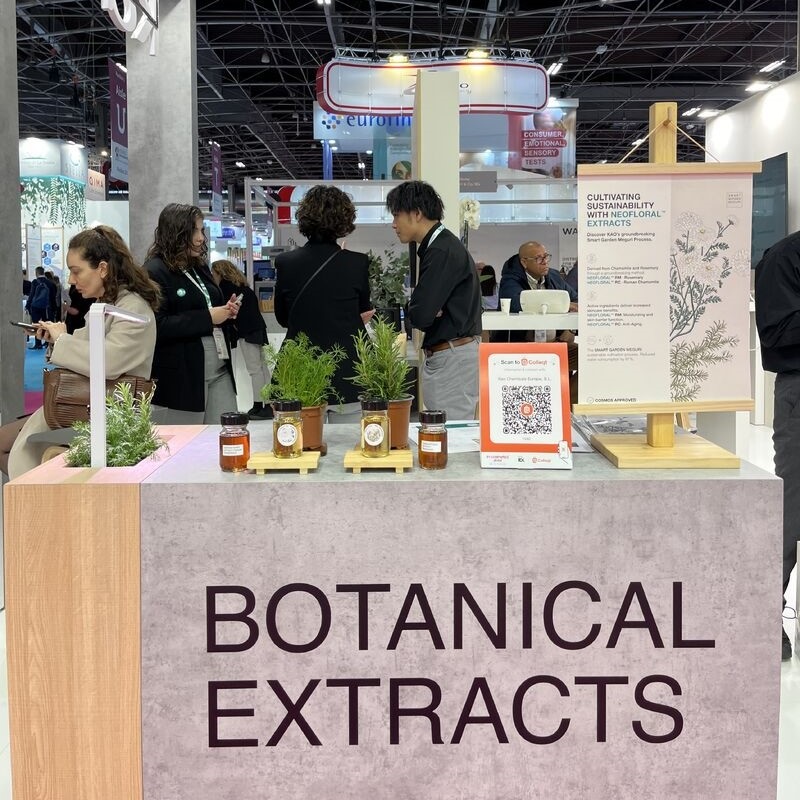
Personal Care Insights caught up with the Japanese chemicals specialist at the In-cosmetics Global industry trade fair in Paris, France to learn more about its latest offerings in beauty active ingredients.
The company draws attention to its plant-based Neofloral Extracts produced through a new environmentally friendly cultivation method that “maximizes the utility of plant enzymes” to reduce impurities.
The method yields “new effects that have not been seen before” in botanical extracts.
“We’re introducing completely new botanical extracts. We cultivate Roman chamomile and rosemary in our plant factory, built to decrease environmental damage associated with traditional farming methods by minimizing water usage, pesticide use and carbon emissions,” Haruhiko Doi, senior researcher at Kao, tells us.
“Also, we improved the performance of extracts by reducing their impurities. Our extract color is lighter than conventional extracts. Our extracts can suppress bacterial growth, while their performance is much better.”
So far, naturality and high functionality retain their label appeal on the botanical beauty market, Doi affirms. “But nowadays, demand for environmental labels is getting higher. In order to achieve this, we started cultivating the plants on our own.”
Kao booth at In-cosmetics Global 2024.New detergent formats
In the home care category, Kao highlights its Attack Zero Perfect Stick, a stick-shaped powdered laundry detergent wrapped in water-soluble film in single-load portions.
Instead of using a hard plastic container, the laundry detergent comes in a pouch, which reduces the amount of plastic used for the product per load.
The launch follows Kao’s introduction of a bottle-type refill pack for CuCute dishwashing liquid, which reduces plastic compared to existing bottles by “approximately 40%” by making the plastic bottle thinner.
Recycling PET into road pavement
Kao intends to recycle resources by producing products and services making use of the plastic waste discarded by all sectors of society and will begin by boosting the recycling rate for plastics it uses to over 50% (by weight) by 2030 through new approaches.
Newtlac 5000 asphalt modifier, created and offered by Kao Chemical Business, converts waste PET into a modifier using in-house technology. According to Kao, adding Newtlac 5000 to asphalt improves pavement durability by up to five times compared to ordinary pavements.
Making asphalt pavement highly durable can help reduce damage to road surfaces and suppress the generation of CO2 associated with repair work. In 2023, the Kao Chemical Business launched a new series featuring improved durability that resolves pavement issues in cold regions with regular snowfall.
Also in 2023, Kao started using 6% recycled plastic in its packaging. Recycled plastic is increasingly being used in PET plastic containers sold in Japan in 2023, for example, in the bottle-type refill pack (extra-large size) for CuCute dishwashing liquid and Resesh Disinfecting Ex Wide Jet clothing and fabric deodorizer.
Additionally, Kao has partnered with local Japanese governments, businesses and other stakeholders to establish a collection scheme for used plastic containers and is developing recycling technologies.
Refillable packaging movement
Together with Lion Corporation, Kao introduced commercialized refill packs partially made with recycled plastic from collected used refill packs for the first time last year. While the new packaging was initially only available in limited quantities, Kao intends to continue R&D in this field.
The company is also conducting various field tests and began testing a new collection scheme in 2023 in Satsumasendai City, Kagoshima Prefecture in Japan, that uses the municipal government’s resource collection routes.
In March 2024, Kao and Kao Group company Kao Transport and Logistics Company Limited received approval from the Japanese Ministry of Economy, Trade and Industry and the Ministry of the Environment for voluntary collection by a manufacturer or retailer for plastic packaging at Kao business locations and in Kamakura City, Kanagawa Prefecture in Japan.
With this approval, Kao and Kao Logistics can collect used refill packs within the Kao Group and in the city of Kamakura without needing to obtain service permission.
“Kao will continue to examine recycling schemes to expand self-directed participation by stakeholders in each step of the recycling process, from sorting and collection to transport and recycling,” states the company.
“[We aim] to gain the understanding and support of consumers in particular as active participants in resource circularity, from product selection and use to sorting, collection and recycling of packaging.”






